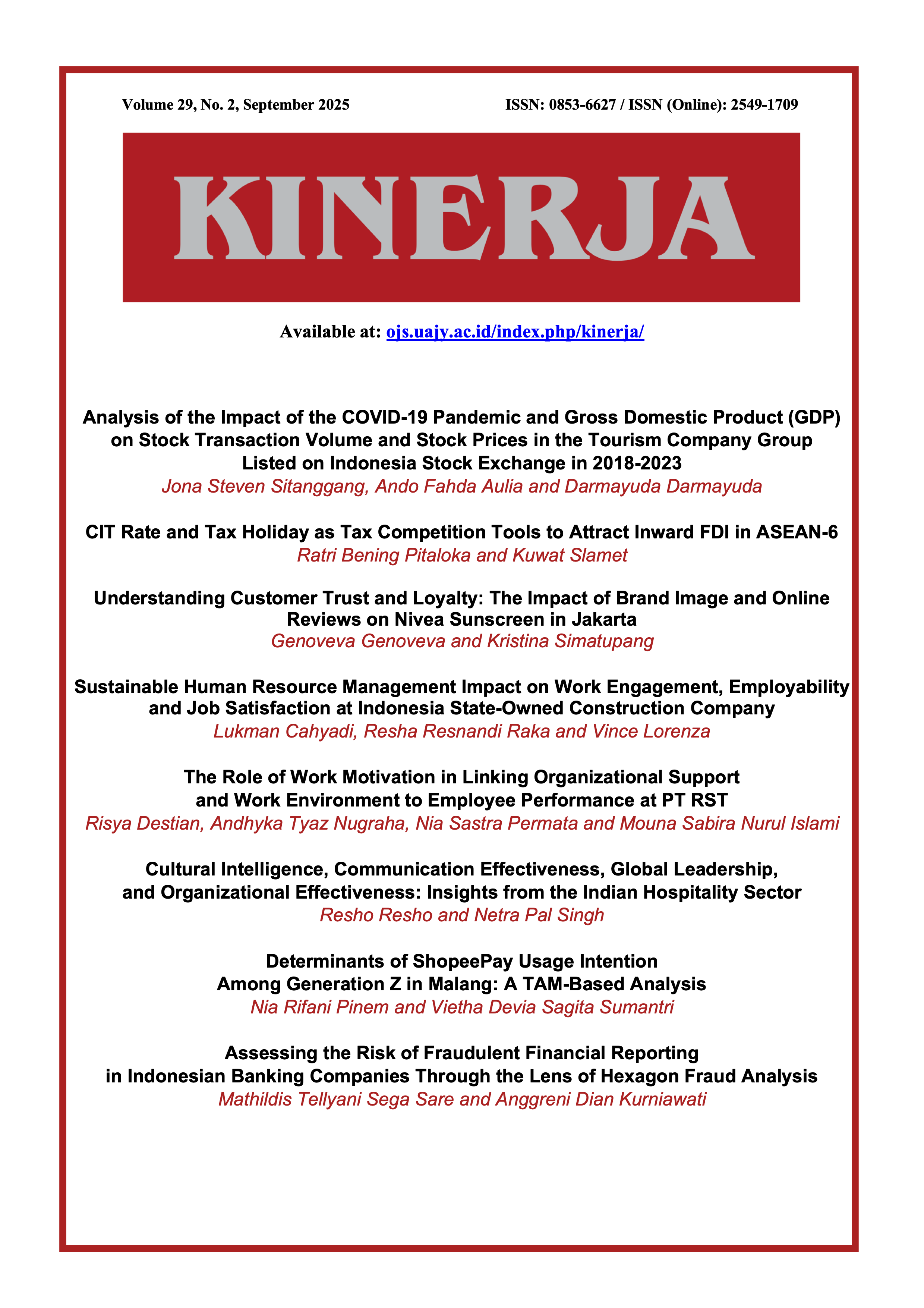Sustainable Human Resource Management Impact on Work Engagement, Employability, and Job Satisfaction at An Indonesian State-Owned Construction Company
DOI:
https://doi.org/10.24002/kinerja.v29i2.11457Keywords:
construction companies, sustainable HRM, work engagement, employabilityAbstract
Sustainable human resource management on employee intrinsic motivation manifests in work engagement, employability, and job satisfaction. This research uses a quantitative-deductive method because it has a clear and measurable population and sample. This research employs the purposive sampling method with permanent employees of an Indonesian state-owned construction company in the construction sector in Indonesia as the respondents. Structured equation model – partial least squares (SEM PLS) is used in processing and analyzing the data obtained. The research results explain the strong influence of SHRM on work engagement, employability, and job satisfaction. This research contributes academically to provide a new perspective for company management to apply the concept of sustainability in human resource management. The findings from this research can be used by policymakers to develop policies for SHRM in their organization. The application of the sustainability concept to human resource management allows companies to gain opportunities to achieve performance from a financial, social, and ecological perspective in the long term.
References
Aboramadan, M., Albashiti, B., Alharazin, H. and Dahleez, K.A., 2020. Human resources management practices and organizational commitment in higher education: The mediating role of work engagement. International Journal of Educational Management, 34(1), pp.154-174. https://doi.org/10.1108/IJEM-04-2019-0160
Abu-Mahfouz, S., Halim, M. S. A., Bahkia, A. S., Alias, N., & Tambi, A. M., 2023. Sustainable human resource management practices in organizational performance: The mediating impacts of knowledge management and work engagement. Journal of Entrepreneurship, Management and Innovation, 19(2). Available at: https://doi.org/10.7341/20231922
Al-Kurdi, B., Elrehail, H., Alzoubi, H.M., Alshurideh, M. and Al-Adaileh, R., 2021. The interplay among HRM practices, job satisfaction and intention to leave: An empirical investigation. Journal of Legal, Ethical & Regulatory Isses, 24, p.1. Available at: https://heinonline.org/hol-cgi-bin/get_pdf.cgi?handle=hein.journals/jnlolletl24§ion=427
Anindita, R., & Emilia Seda, A., 2018. How employee engagement mediates the influence of individual factors toward organizational commitment. Problems and Perspectives in Management, 16(1), pp.276–283. Available at: https://doi.org/10.21511/ppm.16(1).2018.27
Asis-Castro, A. L., & Edralin, D. M., 2018. Predictors of humanistic sustainability hrm practices. DLSU Business and Economics Review, 27(2), pp.130–146.
Cahyadi, A., Poór, J., & Szabó, K., 2022. Pursuing consultant performance: The roles of sustainable leadership styles, sustainable human resource management practices, and consultant job satisfaction. Sustainability (Switzerland), 14(7), p.3967. Available at: https://doi.org/10.3390/su14073967
Chen, K., & Chen, C., 2022. Effects of university teachers’ emotional labor on their well-being and job satisfaction. Revista de Cercetare Si Interventie Sociala, 78, pp.123–132. Available at: https://doi.org/10.33788/rcis.78.8
De Vos, A., & Van der Heijden, B. I., 2017. Current thinking on contemporary careers: the key roles of sustainable HRM and sustainability of careers. Current Opinion in Environmental Sustainability, 28(February), pp.41–50. Available at: https://doi.org/10.1016/j.cosust.2017.07.003
Dumont, J., Shen, J., & Deng, X., 2017. Effects of green HRM practices on employee workplace green behavior: The role of psychological green climate and employee green values. Human Resource Management, 56(4), pp.613–627. Available at: https://doi.org/10.1002/hrm.21792
Ehnert, I., Parsa, S., Roper, I., Wagner, M., & Muller-Camen, M., 2016. Reporting on sustainability and HRM: A comparative study of sustainability reporting practices by the world’s largest companies. International Journal of Human Resource Management, 27(1), pp.88–108. Available at: https://doi.org/10.1080/09585192.2015.1024157
Esen, D. and Özer, P.S., 2020. Sustainable human resources management (HRM) a study in Turkey context and developing a sustainable HRM questionnaire. International Journal of Management Economics and Business, 16(3), pp.550–580. Available at: https://doi.org/10.17130/ijmeb.798548
Forrier, A., & Sels, L., 2003. The concept employability: A complex mosaic. International Journal of Human Resources Development and Management, 3(2), pp.102–124. Available at: https://doi.org/10.1504/IJHRDM.2003.002414
Harvey, G., Williams, K., & Probert, J., 2013. Greening the airline pilot: HRM and the green performance of airlines in the UK. International Journal of Human Resource Management, 24(1), pp.152–166. Available at: https://doi.org/10.1080/09585192.2012.669783
Ingusci, E., Signore, F., De Carlo, E., & Angelelli, M., 2023. Human resources management practices and job satisfaction: The moderating role of seeking challenges. A Longitudinal Study Through PLS-SEM. Electronic Journal of Applied Statistical Analysis, 16(1), pp.25–49. Available at: https://doi.org/10.1285/i20705948v16n1p25
Jerónimo, H. M., de Lacerda, T. C., & Henriques, P. L., 2020. From sustainable HRM to employee performance: A complex and intertwined road. European Management Review, 17(4), pp.871–884. Available at: https://doi.org/10.1111/emre.12402
Kahn, W. A., 1990. Psychological conditions of personal engagement and disengagement at work. Academy of Management Journal, 33(4), pp.692–724. Available at: https://doi.org/10.5465/256287
Kalawilapathirage, H., Omisakin, O., & Zeidan, S., 2019. A data analytic approach of job satisfaction: A case study on airline industry. Journal of Information & Knowledge Management, 18(01), p.1950003. Available at: https://doi.org/10.1142/S0219649219500035
Karman, A., 2020. Understanding sustainable human resource management-organizational value linkages: The strength of the SHRM system. Human Systems Management, 39(1), pp.105–115. Available at: https://doi.org/10.3233/HSM-190602
Keeble, B. R., 1988. The brundtland report: “Our common future.” Medicine and War, 4(1), pp.17–25. Available at: https://doi.org/10.1080/07488008808408783
Kramar, R., 2022. Sustainable human resource management: Six defining characteristics. Asia Pacific Journal of Human Resources, 60(1), pp.146–170. Available at: https://doi.org/10.1111/1744-7941.12321
Locke, E. A., 1969. What is job satisfaction? Organizational Behavior and Human Performance, 4(4), pp.309–336. Available at: https://doi.org/10.1016/0030-5073(69)90013-0
Lulewicz-Sas, A., Kinowska, H., & Fryczyńska, M., 2022. How sustainable human resource management affects work engagement and perceived employability. Economics and Sociology, 15(4), pp.63–79. Available at: https://doi.org/10.14254/2071-789X.2022/15-4/3
Marsh and GuyCarpenter, 2021. Future of Construction. Oxford Economics, September. Available at: https://www.oxfordeconomics.com/resource/future-of-construction/
Martini, M., Riva, E., & Marafioti, E., 2023. Sustainable HRM, training for employability and organizational outcomes: The moderating role of competitive intensity. Employee Relations, 45(7), pp.79–102. Available at: https://doi.org/10.1108/ER-02-2022-0072
McLennan, M., 2023. Construction industry insights Outlook for the construction industry. 1–9. Available at: https://www.marsh.com/bw/industries/construction/insights/global-construction-outlook.html
McQuaid, R. W., & Lindsay, C., 2005. The concept of employability. Urban Studies, 42(2), pp.197–219. Available at: https://doi.org/10.1080/0042098042000316100
Navajas-Romero, V., Ceular-Villamandos, N., Pérez-Priego, M. A., & del Río, L. C. L., 2022. Sustainable human resource management the mediating role between work engagement and teamwork performance. PLoS ONE, 17(8 August). Available at: https://doi.org/10.1371/journal.pone.0271134
Parakandi, M., & Behery, M., 2016. Sustainable human resources: Examining the status of organizational work-life balance practices in the United Arab Emirates. Renewable and Sustainable Energy Reviews, 55, pp.1370–1379. Available at: https://doi.org/10.1016/j.rser.2015.07.095
Rothwell, A., & Arnold, J., 2007. Self-perceived employability: Development and validation of a scale. Personnel Review, 36(1), pp.23–41. Available at: https://doi.org/10.1108/00483480710716704
Sarmiento, R., Beale, J., & Knowles, G., 2007. Determinants of performance amongst shop-floor employees: A preliminary investigation. Management Research News, 30(12), pp.915–927. Available at: https://doi.org/10.1108/01409170710833349
Schaufeli, W. B., Bakker, A. B., & Salanova, M., 2006. The measurement of work engagement with a short questionnaire: A cross-national study. Educational and Psychological Measurement, 66(4), pp.701–716. Available at: https://doi.org/10.1177/0013164405282471
Schaufeli, W. B., Salanova, M., Bakker, A. B., & Gonzales-Roma, V., 2002. The measurement of engagement and burnout: A two sample confirmatory factor analytic approach. Journal of Happiness Studies, 3, pp.71–92. Available at: https://doi.org/10.1023/A:1015630930326
Sidabutar, E., Syah, T. Y. R., & Anindita, R., 2020. The Impact of compensation, motivation, and job satisfaction on employee performance. Multidisciplinary Academics, 4.
Stankevičiūtė, Ž., & Savanevičienė, A., 2018. Raising the curtain in people management by exploring how sustainable HRM translates to practice: The case of Lithuanian organizations. Sustainability, 10(12), p.4356. Available at: https://doi.org/10.3390/su10124356
Strenitzerová, M., & Achimský, K., 2019. Employee satisfaction and loyalty as a part of sustainable human resource management in postal sector. Sustainability (Switzerland), 11(17). Available at: https://doi.org/10.3390/su11174591
Sypniewska, B., Baran, M., & Kłos, M., 2023. Work engagement and employee satisfaction in the practice of sustainable human resource management – based on the study of Polish employees. International Entrepreneurship and Management Journal, 19(3), pp.1069–1100. Available at: https://doi.org/10.1007/s11365-023-00834-9
Van der Heijde, C. M., & van der Heijden, B. I. J. M., 2005. The development and psychometric evaluation of a multi-dimensional measurement instrument of employability-and the impact of aging. International Congress Series, 1280, pp.142–147. Available at: https://doi.org/10.1016/j.ics.2005.02.061
Van der Klink, J.J., Bültmann, U., Burdorf, A., Schaufeli, W.B., Zijlstra, F.R., Abma, F.I., Brouwer, S. and Van der Wilt, G.J., 2016. Sustainable employability—definition, conceptualization, and implications: a perspective based on the capability approach. Scandinavian Journal of Work, Environment & Health, 42(1), pp.71–79. Available at: https://www.jstor.org/stable/43999197
Xu, F. Z., Zhang, Y., Yang, H., & Wu, B. T., 2020. Sustainable HRM through improving the measurement of employee work engagement: Third-person rating method. Sustainability (Switzerland), 12(17), pp.1–22. Available at: https://doi.org/10.3390/su12177100
Downloads
Published
Issue
Section
License
Copyright (c) 2025 Lukman Cahyadi, Resha Resnandi Raka, Vince Lorenza Utami

This work is licensed under a Creative Commons Attribution 4.0 International License.















